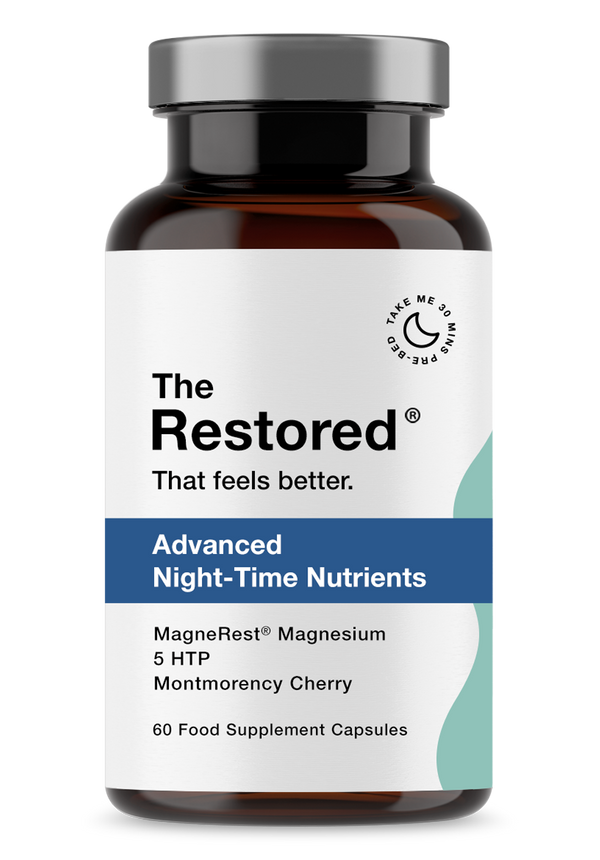When you’re struggling to fall asleep at night, it’s easy to turn to that trusty bottle of Benadryl. Sure, popping a few pills will put you to sleep fast, but antihistamine sleeping pills are a bad idea for your health. Once you peel back the layers to see the frightening stats behind these products, you might want to find a more natural sleep aid for turning in each night.
Thankfully, there are plenty of options for getting healthier rest each night. But first, you need to know why antihistamine sleep aids are not a smart way to fall asleep.
The Problem with Antihistamine Tablets as Sleeping Pills
Insomnia is a major concern in the UK today. Over thirty percent of the population occasionally struggles with the condition, and 12 million prescriptions for sleeping pills are written each year. Chronic sleeplessness is a problem that costs the NHS £36 million annually, and the situation is only worsening.
The “solution” for millions is turning to over-the-counter sleep aids that contain antihistamines to promote drowsiness. Antihistamines counteract the functioning of histamines, a chemical produced by the central nervous system. Histamines are released by your body cells when they are triggered, which usually happens through an injury or an allergic reaction.
Antihistamines are primarily included in medications to treat the symptoms of hay fever and other allergies. It’s their job to block or reduce the functioning of histamines so that they halt allergy symptoms. This causes you to experience common allergy symptoms like sneezing, inflammation, rashes, swelling, and other signs of irritation.
Notably, these medications are only meant to be used for short-term treatment for allergy flare-ups, not as a permanent solution for combating poor sleep. Using them two or three times in a row is okay, but after that point, you might run into problems.
These days, many people are turning to antihistamines even when they aren’t sick just to help them sleep. However, taking medication that’s formulated for a separate health problem in order to sleep better isn’t smart - for numerous reasons.
Side effects of taking antihistamine medications
Common antihistamine medications that also list drowsiness as a side effect include diphenhydramine, doxylamine, piriton, Benadryl, and others.
The majority of sleep-promoting products these days contains antihistamines from one of them. In fact, tracking down OTC sleep aids without diphenhydramine isn’t easy- and that has ramifications for your health.
These medications might clear up your allergies, but their side effects tend to be unpleasant. Examples include confusion, hallucinations, dry mouth, blurred vision, constipation, nausea, impaired sweating, inability to empty the bladder completely (urinary retention) and a rapid heart rate (tachycardia).
And, while the whole point of taking antihistamines when you aren’t sick is to sleep better, these medications actually tend to lower your overall sleep quality. They sometimes even trigger hyperactivity in small children, a highly undesirable side effect.
Long-term risks of taking antihistamines
You might think that using an antihistamine medication like piriton as a sleep aid is an easy solution for effortless rest, but you might have to live with its health complications far into the future. Long-term use can trigger muscle spasms, which consequently lead to worse insomnia.
Even worse, research in the Journal of American Medicine (JAMA) reveals that taking antihistamines might be linked with memory loss and cognitive decline- providing evidence that there is a link between the medications and dementia.
As the symptoms are worse for older adults and those with preexisting health conditions, a large portion of the population shouldn’t use antihistamines at all.
Natural alternatives to Benadryl tablets for sleeping
Knowing the risks of taking an antihistamine for your health, what kind of sleep aid should you try instead? Unfortunately, many over-the-counter sleep aids are actually antihistamine drugs that are branded as sleep aids instead.
It pays to be cautious with what you choose and to look for a non-diphenhydramine sleep aid instead.
The benefits of Advanced Night-Time Nutrients as a natural sleep aid
At The Restored, we created Advanced Night-Time Nutrients to offer you an all-natural alternative to antihistamine medications to improve your sleep. This supplement is better for you than a diphenhydramine sleep aid because it contains the kinds of ingredients that help your body sleep better naturally- without adverse side effects. Our natural sleep aid combines the benefits of natural melatonin through a Melo-Fruit® blend with potent vitamins like taurine, tryptophan, Griffonia seed extract (5-HTP), and Montmorency cherry.
Each of these compounds brings unique benefits to the supplement to promote your health. Taurine can support a natural calming effect for your body, and natural melatonin regulates your sleep levels so that you begin to feel tired once it gets dark outside. Tryptophan (an amino acid that makes you sleepy when you eat turkey) balances out your hormone levels so you stay asleep, 5-HTP, one of its byproducts, can boost your serotonin levels so that you feel happier and more relaxed.
A sleep aid that really works
Can our natural sleep aid help you sleep even though it’s free of histamines? Our customers seem to think so. Survey results reveal that three out of four (97%) found that the supplement helped them fall asleep faster and stay that way longer. Try Advanced Night-Time Nutrients instead of an antihistamine today, and you’ll experience better sleep because of it.
Visit The Restored Blog for more practical guidance to help restore your foundations in sleep, nutrition, movement and mindset.
 Skip to content
Skip to content



Leave a comment